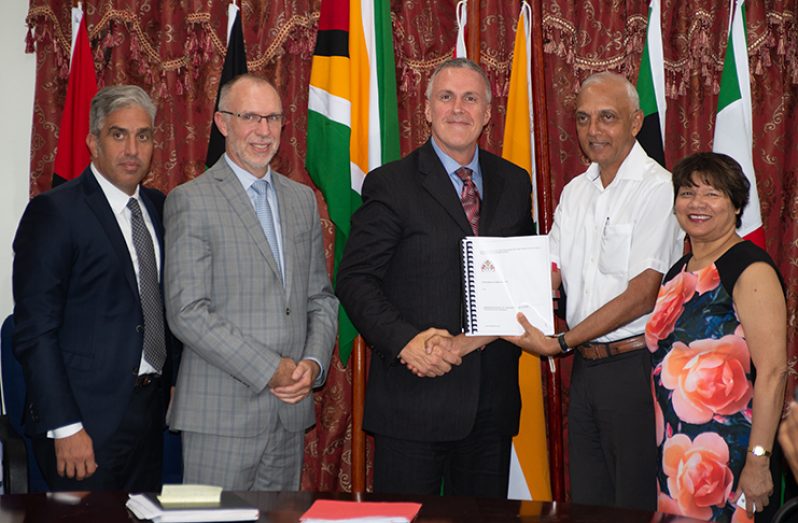THE town of New Amsterdam will lead the way in the complete modernisation of Guyana’s property valuation system, set to improve the collection of property rates within Local Democratic Organs (LDOs).
The project will be conducted by the Municipal Property Assessments Canada (MPAC) and AxiLogic Inc. and will eventually expand itself to other parts of the country.
Earlier this year, Cabinet had approved for some $335M to be spent in this regard while a US$125,000 contract signed on Monday will fund a pilot engagement for New Amsterdam to last for 12 months.
At the ceremony, Minister of Communities Ronald Bulkan stated that the updating and modernisation of the current property inventory will commence immediately and will significantly improve future operations.
“It’s one of the measures and components that will allow for Central Government support to the restoration of capacity and functionality within our Local Government organs,” Bulkan explained, adding:
“As part of the government’s agenda to restore functionality to this system that has been severely damaged and degraded over an extended period of time, the question of the revenue base of our councils is one of the major impediments and it is the desire of central government to work with our local councils to ensure that the sore issue of fiscal sustainability receives the requisite support that is needed.”
Also attending the function were Co-founder and President of AxiLogic Inc. Michael Chettleburgh; Co-founder and Chief Executive Officer (CEO) of AxiLogic Inc. John Psihos and MPAC’s President of Business Development, Antoni Wisniowski.
Chettleburgh said that the town of New Amsterdam was selected due to the state of its existing data and the level of engagement experienced with the council there.
From the pilot intervention, a guideline will be developed for dealing with other LDOs across the country and will work in-keeping with the country’s legislation and regulatory framework.
“From that process we will learn a lot about what to do and how to do the national work. So, we’re going to use that in a controlled context to see what resources we have; train local staff and then roll out nationally,” he said.
He added that one of the major challenges faced in Georgetown is the non-payment of arrears which the team will seek to address by changing the communication approach to rate payers.
The last national valuation exercise in Guyana was conducted over 40 years ago while the long overdue re-valuation of properties continues to challenge councils with inadequate data and inequity complications.
This is according to Bulkan, who reminded that the principal revenue tool of local council is the collection of property rates within their jurisdiction.
“There are many properties of considerable value and in the absence of reliable information; there are cases where the rates of modest, residential properties are actually at the same level of highly priced properties and it poses a severe impediment to councils to be able to have an equitable rating regime. It impacts seriously and severely on council’s ability to garner sufficient revenue,” he said.
The component which paved the way for such improvements was the renewal of democracy with the holding of Local Government Elections [LGE] in 2016 and scheduled again for November 12, 2018.
Bulkan said that this will mark the first time, in Guyana’s post-independence history, that successive LGE’s will be held as legally due.
“It is, I believe, ample evidence and testimony to the commitment and sincerity of this administration to restore the system of Local Government to its rightful place in the governance architecture,” he said.
Meanwhile, sensitisation efforts on the updating and modernisation of the property valuation system are set to begin soon in New Amsterdam.
“It’s important for the local owners of properties to understand the context for this exercise that it is about a proper valuation and [developing] a proper inventory so there will be public awareness materials, campaigns, created as a result to educate tax payers or rate payers or property owners what property valuation is, what they can expect from us-the valuation office,” Chettleburgh said.



.jpg)








